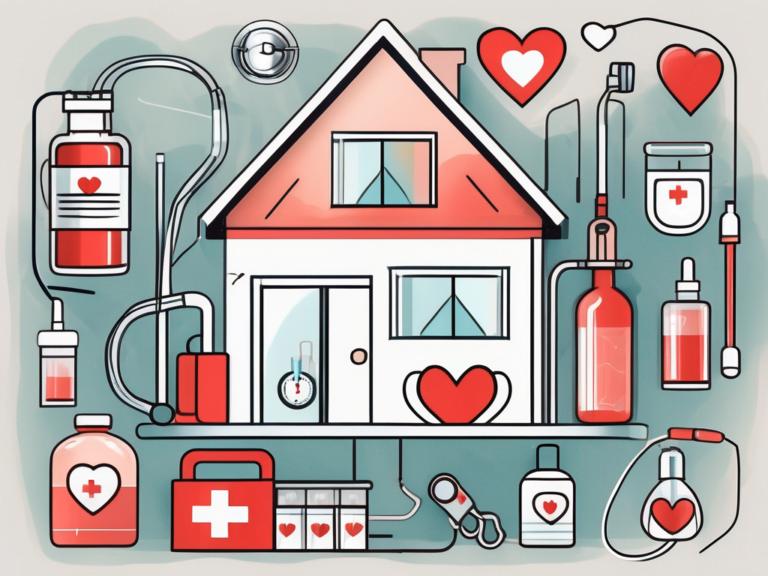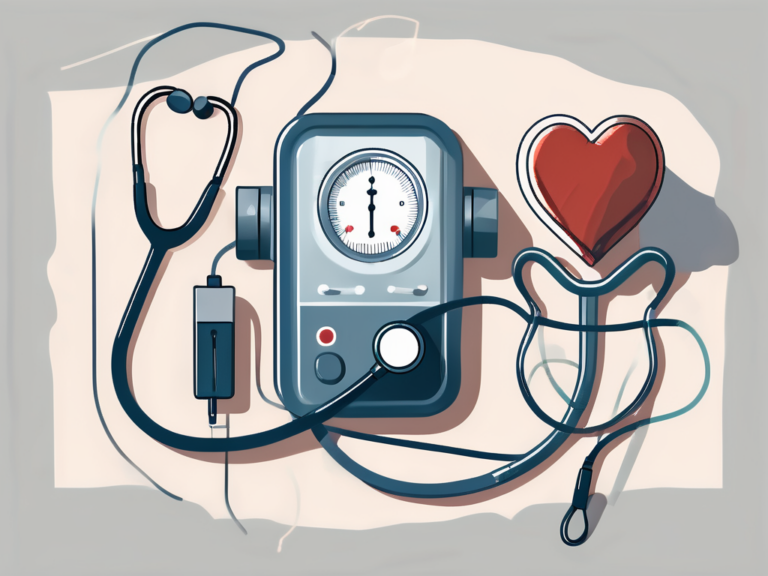How to Check Heart Health at Home: A Comprehensive Guide
In today’s fast-paced world, taking care of our health has become more important than ever. One crucial aspect of our well-being is our heart health. Our heart is responsible for pumping oxygen-rich blood throughout our body, providing the necessary nutrients and oxygen to keep us alive and functioning optimally. Unfortunately, heart diseases are prevalent, and early detection is vital for timely intervention and prevention. That’s where checking our heart health at home becomes invaluable. In this comprehensive guide, we will explore the importance of heart health, the tools required for home checks, the steps to perform these checks, how to interpret the results, and the necessary steps to maintain a healthy heart.
Understanding the Importance of Heart Health
Our heart is a tireless worker, beating around 100,000 times and pumping about 2,000 gallons of blood every day. Its primary function is to circulate oxygen and nutrients to every organ and tissue in our body. By understanding the significance of heart health, we can take the necessary steps to safeguard it and live a long, healthy life.
The Role of the Heart in the Body
The heart’s role is crucial, and any disruption can have severe consequences. It supplies oxygen and nutrients to our body, allowing our organs to function optimally. Additionally, it removes waste products such as carbon dioxide and other metabolic byproducts. Proper heart function is essential for overall well-being.
Common Heart Diseases and Their Symptoms
Heart diseases can be life-threatening if left untreated, making it crucial to recognize their symptoms early on. Common heart diseases include coronary artery disease, heart failure, arrhythmias, and heart valve diseases. Symptoms can vary, but they may include chest pain, shortness of breath, fatigue, dizziness, and irregular heartbeats.
Why Regular Heart Health Checks are Essential
Regular heart health checks play a pivotal role in detecting abnormalities or potential heart diseases. By monitoring our heart health at home, we can identify any early warning signs and take the necessary steps to address them. Early intervention can make a significant difference in managing heart diseases and preventing complications.
It is important to note that heart health is influenced by various factors, including lifestyle choices and genetics. Engaging in regular physical activity, maintaining a balanced diet, managing stress levels, and avoiding smoking are all essential in promoting a healthy heart. Additionally, understanding your family’s medical history can provide valuable insights into potential risks and allow for proactive measures to be taken.
Furthermore, staying informed about the latest advancements in heart health research is crucial. Medical breakthroughs and innovative treatments are constantly emerging, offering new hope for those affected by heart diseases. By staying updated, individuals can make informed decisions about their own heart health and explore new treatment options that may be available.
Basic Tools for Checking Heart Health at Home
Making the decision to check your heart health at home is the first step towards proactive care. Fortunately, there are various tools available to help you accurately monitor your heart health without leaving the comfort of your home.
Blood Pressure Monitors
A reliable blood pressure monitor is a must-have for every household. It allows you to measure your blood pressure, which is a significant indicator of heart health. Opt for an automatic blood pressure monitor for convenience and ease of use.
When using a blood pressure monitor, it’s important to follow the proper technique. Sit in a quiet and comfortable environment, with your feet flat on the floor and your arm supported at heart level. Place the cuff snugly around your upper arm and activate the monitor. As the cuff inflates and deflates, it will provide you with accurate readings of your systolic and diastolic blood pressure.
Heart Rate Monitors
Heart rate monitors are essential tools for tracking your heart’s rhythm and rate. These handheld devices or smartwatches provide real-time feedback on your heart rate, allowing you to identify any irregularities or changes.
When using a heart rate monitor, ensure that it is properly positioned on your wrist or chest for accurate readings. It’s important to note that factors such as physical activity, stress, and medication can influence your heart rate. By monitoring your heart rate regularly, you can detect any abnormalities and consult with your healthcare provider for further evaluation.
Smart Devices and Apps for Heart Health
With advancements in technology, smart devices and mobile apps have become prominent tools for monitoring heart health. These devices can track your heart rate, blood pressure, and even location, providing a comprehensive overview of your heart health.
Some smart devices and apps also offer additional features such as sleep tracking, stress management, and personalized exercise plans. By incorporating these tools into your daily routine, you can gain valuable insights into your heart health and make informed decisions about your overall well-being.
Remember, while these tools are helpful for monitoring your heart health at home, they should not replace regular check-ups with your healthcare provider. If you notice any significant changes or have concerns about your heart health, it’s important to seek professional medical advice for a thorough evaluation.
Steps to Check Your Heart Health at Home
Now that you have the necessary tools, it’s time to learn how to perform a comprehensive heart health check at home. Follow these steps to ensure accurate readings and gain valuable insights into your heart’s well-being.
Measuring Your Heart Rate
Begin by measuring your heart rate at rest. Find a quiet spot where you can sit comfortably and relax. Place your finger on the pulse point of your wrist or neck and count the number of beats for one minute. This will give you an idea of your resting heart rate.
Monitoring Your Blood Pressure
For accurate blood pressure readings, ensure you are relaxed and sitting comfortably. Follow the instructions provided with your blood pressure monitor to correctly measure your blood pressure. Take multiple readings at different times to establish a reliable average.
Checking for Irregular Heartbeats
Irregular heartbeats, also known as arrhythmias, can be challenging to detect. However, some heart rate monitors and smart devices have built-in features that can alert you to irregular rhythms. Consult your device’s instructions to enable this feature and follow the recommended steps for monitoring.
It is important to note that while monitoring your heart health at home can provide valuable insights, it is not a substitute for professional medical advice. If you have any concerns or notice any unusual symptoms, it is always best to consult with a healthcare professional.
In addition to measuring your heart rate, blood pressure, and checking for irregular heartbeats, there are other lifestyle factors that can contribute to heart health. Maintaining a balanced diet, engaging in regular physical activity, managing stress levels, and getting enough sleep are all essential for a healthy heart.
When it comes to diet, incorporating heart-healthy foods such as fruits, vegetables, whole grains, lean proteins, and healthy fats can make a significant difference. Avoiding excessive salt, sugar, and saturated fats is also crucial for maintaining optimal heart health.
Regular exercise is another key component of a heart-healthy lifestyle. Aim for at least 150 minutes of moderate-intensity aerobic activity or 75 minutes of vigorous-intensity aerobic activity per week. This can include activities such as brisk walking, cycling, swimming, or dancing.
Managing stress is essential for overall well-being, including heart health. Find healthy coping mechanisms that work for you, such as deep breathing exercises, meditation, yoga, or engaging in hobbies that bring you joy and relaxation.
Lastly, getting enough sleep is vital for heart health. Aim for 7-8 hours of quality sleep each night. Poor sleep can lead to an increased risk of heart disease, high blood pressure, and other cardiovascular problems.
Interpreting Your Heart Health Results
Now that you have performed the necessary checks, it’s time to interpret the results and gain valuable insights into your heart health. Understanding the significance of various readings will empower you to take appropriate action and seek medical attention when necessary.
Understanding Heart Rate Readings
A normal resting heart rate typically ranges between 60 to 100 beats per minute. However, individual factors such as age, fitness level, and medications can influence your heart rate. It’s important to note that athletes and individuals who engage in regular exercise may have lower resting heart rates, which is a sign of good cardiovascular fitness.
On the other hand, a consistently high resting heart rate may indicate an underlying health condition such as hypertension, thyroid problems, or even stress. It’s crucial to consult with your healthcare professional for an accurate interpretation of your heart rate readings and to determine if further evaluation is necessary.
What Your Blood Pressure Numbers Mean
When interpreting your blood pressure readings, it’s essential to consider both the systolic and diastolic numbers. The systolic pressure represents the force exerted on the arterial walls when the heart contracts, while the diastolic pressure represents the force when the heart is at rest between beats.
A systolic pressure between 90 and 120 mmHg and a diastolic pressure between 60 and 80 mmHg are generally considered healthy. However, it’s important to remember that blood pressure can fluctuate throughout the day due to various factors such as physical activity, stress, and even the time of day.
If your blood pressure consistently falls outside the normal range, it may be an indication of hypertension, which can increase the risk of heart disease, stroke, and other cardiovascular complications. It’s crucial to consult your healthcare professional for personalized guidance and to discuss any concerns you may have.
When to Seek Medical Attention
While home checks are valuable, they are not a substitute for professional medical advice. If your heart rate or blood pressure readings are consistently outside the normal range or if you experience concerning symptoms such as chest pain, shortness of breath, or dizziness, it is crucial to seek medical attention promptly.
Your healthcare professional will provide an accurate diagnosis and recommend appropriate treatment based on a comprehensive evaluation of your medical history, physical examination, and possibly additional tests. Remember, early detection and intervention are key to managing and preventing heart-related conditions.
Maintaining Heart Health at Home
Once you have gained insights into your heart health, it’s essential to take proactive steps to maintain and improve it. By adopting heart-healthy habits, you can reduce the risk of heart diseases and enhance your overall well-being.
Healthy Diet for Heart Health
A balanced diet rich in fruits, vegetables, lean proteins, whole grains, and healthy fats is essential for heart health. Not only do these foods provide essential nutrients, but they also contain antioxidants and fiber that promote heart health. Antioxidants help protect against oxidative stress, which can damage the arteries and increase the risk of heart disease. Fiber, on the other hand, helps to lower cholesterol levels and maintain a healthy weight.
When it comes to cooking methods, opt for heart-healthy options such as grilling, baking, and steaming. These methods help to retain the nutritional value of the food while minimizing the use of added fats and oils. By reducing your intake of processed foods, saturated and trans fats, and excessive salt and sugar, you can further support your heart health.
Exercises to Improve Heart Health
Regular physical activity is key to maintaining cardiovascular health. Engaging in aerobic exercises such as walking, jogging, swimming, or cycling for at least 150 minutes per week can help strengthen your heart and improve blood circulation. These activities increase your heart rate and breathing, allowing your heart to pump more efficiently.
In addition to aerobic exercises, incorporating strength training exercises into your routine can further enhance your overall fitness. Strength training helps to build muscle mass, which in turn improves your metabolism and helps maintain a healthy weight. It also helps to lower blood pressure and reduce the risk of developing diabetes, both of which are risk factors for heart disease.
Stress Management and Heart Health
Chronic stress can significantly impact heart health. When you experience stress, your body releases stress hormones that can increase blood pressure and heart rate. Over time, this can lead to the development of heart disease.
To manage stress effectively, it’s important to explore stress management techniques. Practices such as meditation, deep breathing exercises, and yoga can help calm the mind and relax the body. These techniques promote a sense of well-being and reduce the negative effects of stress on the heart.
Additionally, engaging in hobbies or activities you enjoy can provide a much-needed break from daily stressors. Whether it’s painting, playing a musical instrument, or gardening, finding time for activities that bring you joy can have a positive impact on your heart health.
Remember, self-care is crucial when it comes to maintaining heart health. Prioritize taking care of yourself both physically and mentally. If you find yourself struggling, don’t hesitate to seek support from loved ones or professionals who can provide guidance and assistance.
Frequently Asked Questions About Heart Health
As we delve deeper into the topic of heart health, it’s natural to have questions. Let’s address some common queries to ensure you have a comprehensive understanding.
Can I Rely Solely on Home Checks for Heart Health?
While home checks provide valuable insights, they should not replace professional medical advice. Regular check-ups with your healthcare professional are essential for a comprehensive assessment of your heart health.
How Often Should I Check My Heart Health at Home?
The frequency of home checks depends on various factors, including your age, existing health conditions, and lifestyle. Consult with your healthcare professional for personalized guidance on how often you should check your heart health.
What Other Factors Can Affect Heart Health?
Apart from regular checks and maintaining a healthy lifestyle, several factors can impact heart health. These include smoking, excessive alcohol consumption, obesity, family history of heart diseases, diabetes, high cholesterol levels, and high-stress levels. Addressing these factors is crucial for optimal heart health.
It’s important to note that while genetics can play a role in heart health, lifestyle choices also have a significant impact. By adopting a heart-healthy diet, engaging in regular physical activity, managing stress levels, and avoiding smoking and excessive alcohol consumption, you can significantly reduce your risk of heart disease.
Additionally, it’s worth mentioning that age is a factor to consider when it comes to heart health. As we age, the risk of developing heart-related conditions increases. Regular check-ups and monitoring become even more important to catch any potential issues early on.
By following this comprehensive guide and taking proactive steps to monitor and maintain your heart health, you are empowering yourself to lead a long, healthy, and fulfilling life. Remember, knowledge is power, and early detection can make all the difference. Embrace heart health checks and make your heart’s well-being a top priority!






